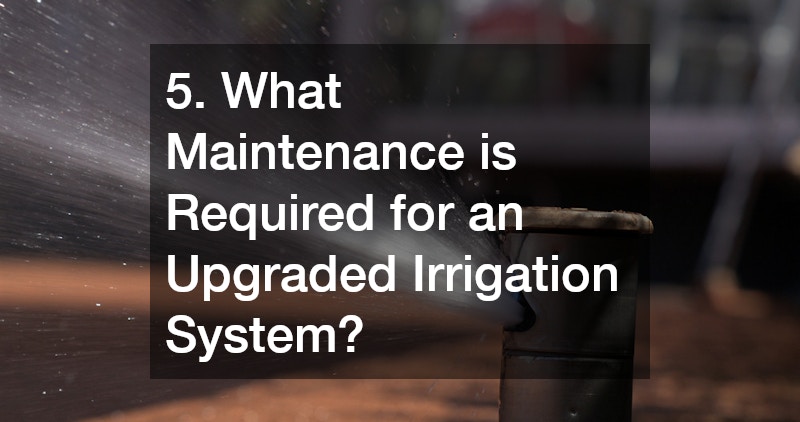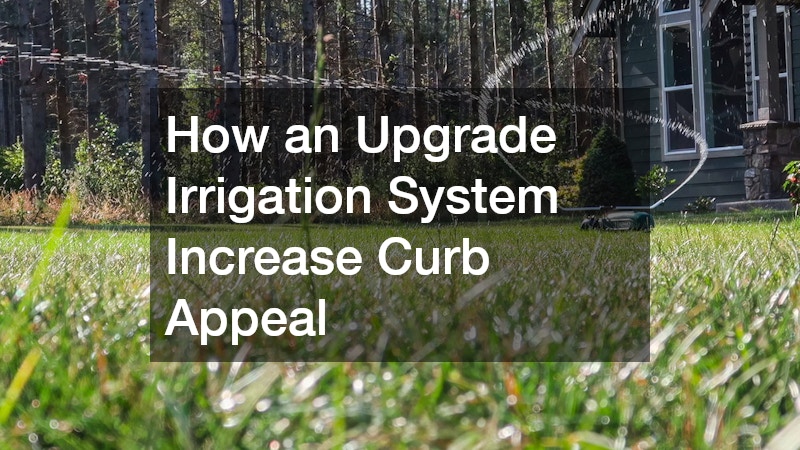In this article, we will explore how upgrading your irrigation system can significantly enhance the curb appeal of your home. Through detailed sections, we’ll answer common questions about the features, costs, and benefits associated with modern irrigation systems.
1. What are the Benefits of Upgrading Your Irrigation System?
1.1 Improved Water Efficiency
Upgrading your irrigation system can lead to significant improvements in water efficiency, reducing overall consumption by as much as 30%. Advanced systems are designed to minimize waste by targeting water directly to plant roots and reducing runoff.
This efficiency not only conserves precious resources but also results in lower water bills, adding to your home’s value proposition. Over time, this can equate to significant savings, making it a practical investment for eco-conscious homeowners.
Additionally, improved water efficiency aids in preventing waterlogging and soil erosion, promoting a healthier landscape. By optimizing the amount and timing of water delivery, plants receive exactly what they need, enhancing their vitality and curb appeal.
1.2 Enhanced Plant Health and Growth
An upgraded irrigation system plays a crucial role in enhancing plant health and growth. By delivering water at optimal times, these systems ensure that plants are not overwatered or underwatered, which is critical for growth.
Modern systems can be customized to cater to the specific water needs of diverse plant species within your garden. This customization ensures that each plant receives appropriate care, resulting in lush, vibrant landscapes.
Moreover, consistent watering schedules prevent stress on plants, which can occur due to irregular watering patterns. Healthy plants not only look more attractive but also contribute to a well-balanced ecosystem in your garden.
2. How Does an Irrigation System Upgrade Affect Property Value?
2.1 Assessing Return on Investment (ROI)
Investing in an upgraded irrigation system can offer a substantial return on investment (ROI). Many homeowners find that the increase in property value more than offsets the initial installation cost.
Real estate experts often highlight the enhanced attractiveness modern irrigation brings to a property, making it more appealing to potential buyers. A well-maintained landscape can be a decisive factor in competitive property markets.
Moreover, the potential savings on water bills and maintenance costs contribute to the long-term financial benefits of upgrading. These savings increase the overall ROI, ensuring the investment pays off over time.
2.2 Comparative Analysis with Neighboring Properties
When upgrading your irrigation system, a comparative analysis with neighboring properties can be illuminating. Homes with advanced irrigation systems often stand out due to their superior landscape management.
This distinction can bolster curb appeal, creating a visual impact that attracts more interest from prospective buyers. It sets your home apart in neighborhoods where such features are less common.
Additionally, keeping up with or exceeding local landscaping standards can help maintain property value in rapidly developing areas. As homebuyers become more environmentally conscious, properties with advanced systems are increasingly in demand.
3. What are the Different Types of Upgraded Irrigation Systems?
3.1 Drip Irrigation Systems
Drip irrigation systems offer a precision water delivery method that’s ideal for both gardens and landscapes. They apply water slowly and directly to the root zones, reducing evaporation losses substantially.
This type of system is beneficial for gardens with diverse plant types, as it can be easily adapted to meet varying moisture needs. Its targeted approach helps in promoting healthy plant growth while minimizing wastage.
Drip systems are also advantageous in preventing weed growth since they provide water directly to the plants and not to the surrounding areas. This can lead to a decrease in the need for herbicides, contributing to an eco-friendly landscape.
3.2 Smart Irrigation Technology
Smart irrigation technology represents the cutting edge of landscape management. These systems incorporate weather data and soil moisture levels to adjust watering schedules automatically.
This intelligent approach ensures that your landscape receives the optimal amount of water regardless of changes in weather conditions. As a result, plants remain healthy, and water usage is as efficient as possible.
Furthermore, many smart systems can be controlled via smartphone apps, offering convenience and control even when you’re away from home. This flexibility makes it easy to maintain a beautiful and sustainable landscape with minimal effort.
4. How to Choose the Right Irrigation System for Your Landscape?
4.1 Evaluating Your Landscape’s Specific Needs
Choosing the right irrigation system requires a careful evaluation of your landscape’s specific needs. Factors such as soil type, plant species, and topography play a crucial role in determining the most effective system.
Assessing these factors can guide you in selecting a system that provides adequate coverage without over-watering. In addition, consideration of seasonal climate patterns can help refine your choice.
4.2 Consultation with Landscaping Professionals
Consulting with landscaping professionals can provide insights and recommendations tailored to your property. Experts can offer advice on the most suitable systems, installation nuances, and maintenance strategies.
This professional guidance ensures that you make informed decisions that align with your budget and aesthetic goals. A well-chosen system can transform your landscape into a visually appealing and functional space.
5. What Maintenance is Required for an Upgraded Irrigation System?
5.1 Seasonal Adjustments and Checks
Maintenance of an upgraded irrigation system involves seasonal adjustments and regular checks. These adjustments ensure that watering schedules align with changing weather conditions and plant needs.
Regular inspections can identify leaks, clogs, or wear in the system, allowing for timely repairs. Proactive maintenance prevents small issues from becoming costly problems.
5.2 Troubleshooting Common Issues
Even advanced irrigation systems can face occasional issues that require troubleshooting. Understanding the common problems, such as controller malfunctions or uneven water distribution, is crucial for effective maintenance.
Quick identification and resolution of issues can prevent damage to your landscape and ensure ongoing efficiency. Many problems are easily addressed with simple adjustments or part replacements.

